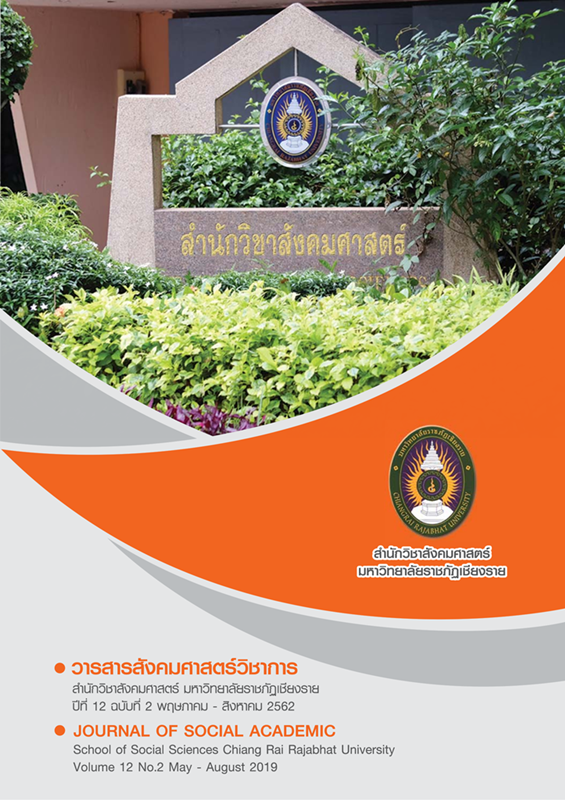The Strategies of Educational Management Administration by using Sufficiency Economic Philosophy in Banpong School, Chiang Rai Primary Educational Service Area Office 1
Main Article Content
Abstract
The purposes of this research were: 1) to study the current and expecting state of educational administration following sufficiency economy philosophy at Banpong School; 2) to investigate causes and factors influencing the educational administration following sufficiency economy philosophy at Banpong School; and 3) to develop the strategies for educational administration following sufficiency economy philosophy at Banpong School. The research employed quantitative and qualitative approach. The research instruments were questionnaire, interview, focus group discussion, and evaluation of suitability and possibility of the strategies. The statistics used in data analysis were frequency, percentage, mean, deviation, PNI Modified index and content analysis on the data from focus group discussion.
The results of the study were: 1) The current state of educational administration following sufficiency economy philosophy at Banpong School,in overall, was found at the high level. The expecting state of the educational administration following sufficiency economy philosophy at Banpong School, in overall, was found at the highest level. 2) The causes and factors influencing the educational administration following sufficiency economy philosophy, in overall, were found at the high level. The aspect holding the highest mean score was materials domain. 3) The strategies for educational administration following sufficiency economy philosophy at Banpong School consisted of eight principal strategies as follows. 1. Upgrade the fund raising for educational administration of the school. 2. Develop the implementation of policy to administration. 3. Support resources raising in curriculum and instructional management. 4. Empower deployment of policy in curriculum and instructional management. 5. Upgrade the use of technology in supporting school administration. 6. Upgrade participation in school administration. 7. Enhance efficiency in the use of technology supporting curriculum and instructional management. 8. Promote learning networking in curriculum and instructional management.
Article Details
รายละเอียดของลิขสิทธ์
References
Every Day: International Society for Technology in Education.
Krittamate Bunnoon. (2014). The Teachers Private Schools Development Strategy for
Fundamental Education. Doctor of Philosophy Program in Innovation Management
for Development. Nakhon Si Thammarat Rajabhat University.
Ministry of Education. (2007). Driving the philosophy of sufficiency economy Educational
institutions. Bangkok.
Preeyanuch Thammapiya. (2013). Economic crisis 1997 and the philosophy of sufficiency
economy. Bangkok: Amarin Printing and Publishing.
Preeyanuch Thammapiya. (2014). Driving the philosophy of sufficiency economy in education (2006 – 2014). Sufficiency Education Center: Yuwasathirakun Foundation.
Rung Kaewdaeng. (2003). Juristic school. Bangkok: Thai Wattana Panich,
Salina Boonkua and Nanthakarn Chinnaphat. (2014). Lesson Learned and analyzing Identity
Center Learn according to the philosophy of sufficiency economy in education.
Sufficiency Education Center: Yuwasathirakun Foundation.
Siriwan Serirat and others. (1997). Strategic Management and Case Studies (full).
Bangkok: Wisit Pattana.
Somyos Navikarn. (1997). Administration and organizational behavior. Bangkok: Manager.
Sureporn Wongsawatsuk. (2008). The study of school curriculum development according
to the sufficiency economy philosophy in Rajawinit Secondary School. Master of
Arts. Bangkok: Graduate School of Srinakharinwirot University.
กระทรวงศึกษาธิการ. (2550). การขับเคลื่อนปรัชญาของเศรษฐกิจพอเพียงสถานศึกษา. กรุงเทพมหานคร.
กฤตเมธ บุญนุ่น. (2557). กลยุทธ์การพัฒนาครูโรงเรียนเอกชนระดับการศึกษาขั้นพื้นฐาน .
ดุษฏีบัณฑิต สาขาวิชาการบริหารนวัตกรรมเพื่อการพัฒนา. มหาวิทยาลัยราชภัฏนครศรีธรรมราช.
ปรียานุช ธรรมปิยา. (2556). วิกฤตเศรษฐกิจ 2540 กับปรัชญาของเศรษฐกิจพอเพียง. กรุงเทพมหานคร:
อมรินทร์พริ้นติ้งแอนด์พับลิชชิ่ง.
ปรียานุช ธรรมปิยา.. (2557). การขับเคลื่อนปรัชญาของเศรษฐกิจพอเพียงด้านการศึกษา (พ.ศ. 2549 –2557). ศูนย์สถานศึกษาพอเพียง: มูลนิธิยุวสถิรคุณ.
รุ่ง แก้วแดง. (2546). โรงเรียนนิติบุคคล. กรุงเทพมหานคร: ไทยวัฒนาพานิช,
ศาลินา บุญเกื้อ และ นันทกาญจน์ ชินประหัษฐ์. (2557). การถอดบทเรียนและวิเคราะห์ อัตลักษณ์ศูนย์การ
เรียนรู้ตามหลักปรัชญาของเศรษฐกิจพอเพียงด้านการศึกษา. ศูนย์สถานศึกษาพอเพียง:
มูลนิธิยุวสถิรคุณ.
ศิริวรรณ เสรีรัตน์ และคณะ. (2540). การบริหารเชิงกลยุทธ์และกรณีศึกษา (ฉบับสมบูรณ์).
กรุงเทพมหานคร: วิสิทธิ์พัฒนา.
สมยศ นาวีการ. (2540). การบริหารและพฤติกรรมองค์การ. กรุงเทพมหานคร: ผู้จัดการ.
สุรีพร วงศ์สวัสดิ์สุข. (2551). การศึกษาการพัฒนาหลักสูตรสถานศึกษาตามแนวปรัชญาเศรษฐกิจพอเพียงใน
โรงเรียนราชวินิต มัธยม. สารนิพนธ์การศึกษามหาบัณฑิต. กรุงเทพมหานคร: บัณฑิตวิทยาลัย
มหาวิทยาลัยศรีนครินทรวิโรฒ.


